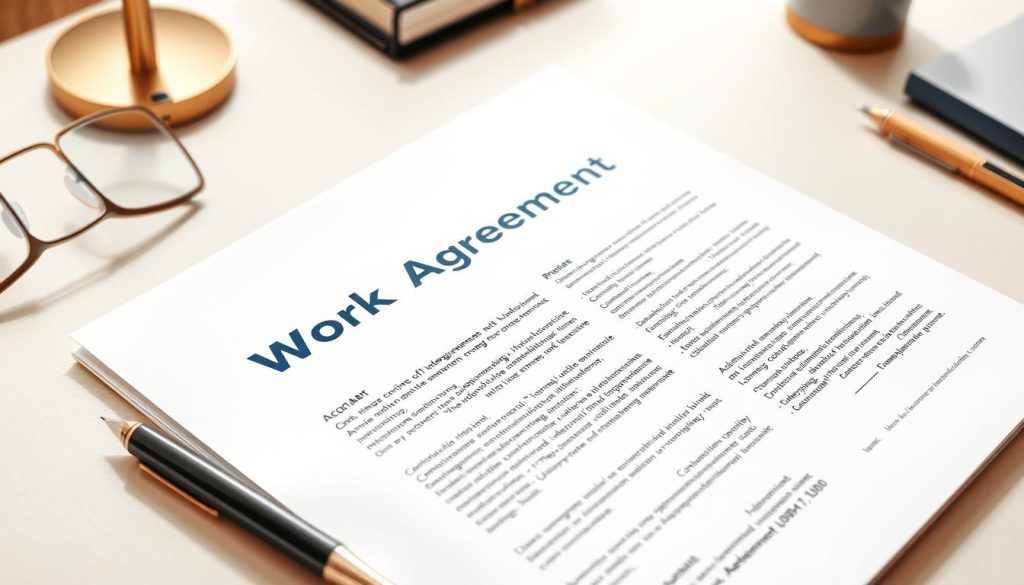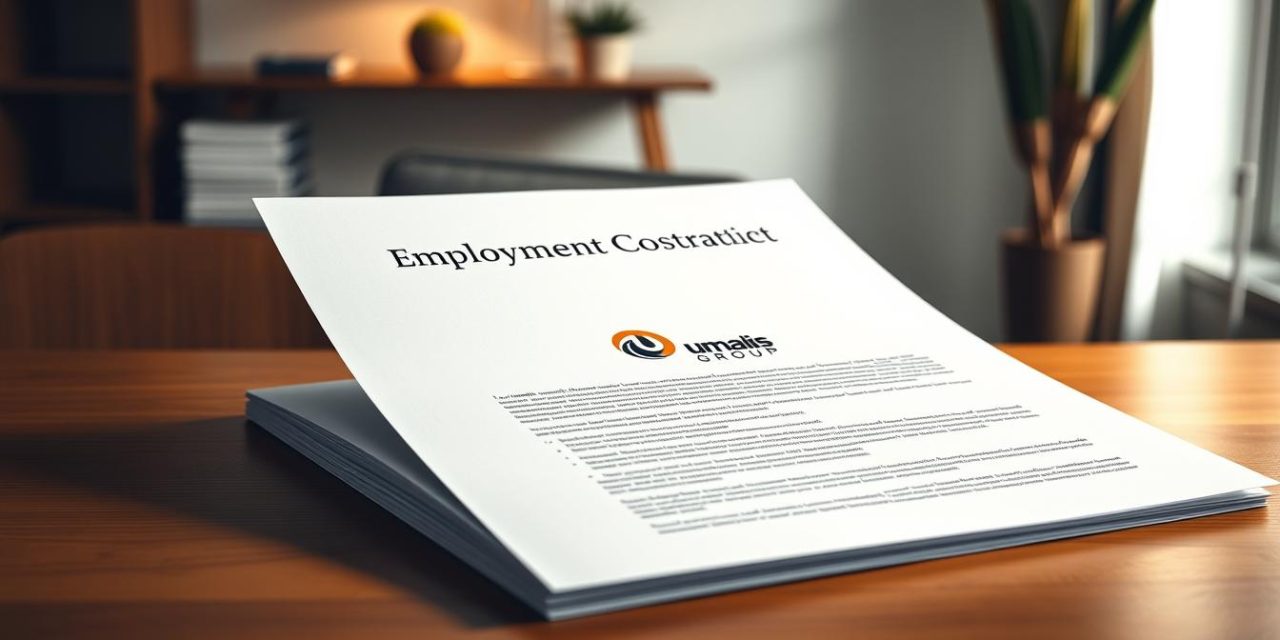As an independent professional in France, navigating the complexities of employment contracts and working conditions can be daunting. Establishing a clear contract with your clients is crucial to protect your rights and ensure a productive working relationship.
With the unique labor laws and regulations in France, it’s essential to understand the nuances of work agreements to maintain your independent status while securing your professional future.
We’ll guide you through the legal framework governing employment contracts for freelancers and consultants, helping you make informed decisions about your working conditions and client relationships.
Table of Contents
Key Takeaways
- Understand the differences between employment contracts and independent work agreements
- Learn how to negotiate favorable terms in your contracts
- Discover the essential components of a comprehensive work agreement
- Recognize potentially problematic clauses in your contracts
- Maintain your independent status while establishing productive client relationships
Understanding Work Agreements in the French Context
Understanding the nuances of work agreements is essential for independent professionals operating in France. The distinction between employment contracts and independent work agreements is crucial, as it affects not only the working relationship but also the legal and financial obligations of both parties.
Definition and Legal Framework
In France, work agreements are governed by a specific legal framework that outlines the terms and conditions of the working relationship. Employment contracts are subject to the Labor Code, which provides a comprehensive set of rules regarding working hours, paid leave, and termination procedures. The employment contract may include a probationary period, allowing the employer to assess the employee’s suitability for the role.
Difference Between Employment Contracts and Independent Work Agreements
The fundamental difference between employment contracts and independent work agreements lies in the concept of subordination. Employees work under the authority of an employer, while independent professionals maintain autonomy in their work. Key differences include:
- Employment contracts are governed by the Labor Code, with regulated working hours and mandatory paid leave.
- Independent work agreements focus on deliverables, project scope, and commercial terms.
- Independent professionals are responsible for their own social security contributions and issue invoices rather than receiving salaries.
| Characteristics | Employment Contracts | Independent Work Agreements |
|---|---|---|
| Working Hours | Regulated by Labor Code | Flexible, based on project scope |
| Compensation | Salary, benefits, and protections | Invoice-based, variable compensation |
| Social Security | Employer contributions | Personal responsibility |
Types of Work Agreements for Independent Professionals

Independent professionals in France have various work agreement options to choose from, each tailored to specific needs and circumstances. The right agreement can provide clarity on the scope of work, payment terms, and the relationship between the professional and the client.
Service Contracts (Contrat de Prestation de Services)
Service contracts are a common type of work agreement for independent professionals. They outline the specific services to be provided, the duration of the contract, and the compensation. « A well-drafted service contract is essential for defining the terms of the working relationship. » These contracts are versatile and can be adapted to various industries and services.
Freelance Agreements (Contrat de Freelance)
Freelance agreements are designed for professionals who work on a project-by-project basis. They typically specify the scope of work, deadlines, and payment terms. Freelance agreements emphasize the independence of the freelancer, distinguishing their role from that of an employee. « Freelance agreements offer flexibility and autonomy, allowing professionals to manage their workload and client base. »
Consulting Agreements (Contrat de Conseil)
Consulting agreements are specialized contracts for professionals providing expert advice and strategic guidance. They highlight the consultant’s expertise and independence, outlining the scope of intervention, deliverables, and client obligations. « Consulting agreements are crucial for establishing a clear understanding between the consultant and the client. » Unlike employment contracts, consulting agreements presume the professional already possesses the required expertise.
In conclusion, understanding the different types of work agreements is vital for independent professionals in France to ensure they choose the most appropriate agreement for their work, protecting their interests and clarifying their professional relationships.
Essential Components of a French Work Agreement
Understanding the essential components of a French work agreement is vital for independent professionals to ensure they are adequately protected and informed. A comprehensive agreement outlines the terms and conditions of the working relationship, providing clarity and legal protection for both parties involved.
Parties and Scope of Services
The work agreement should clearly identify the parties involved, including the independent professional and the client. It should also define the scope of services to be provided, outlining the specific tasks, deliverables, and expectations.
Duration and Termination Conditions
The agreement must specify the duration of the contract, including the start and end dates, as well as any conditions for renewal or termination. The French Labor Code sets specific guidelines for the probationary period, which varies depending on the employee’s profile and position. For instance, the probationary period is two months for blue-collar and office workers, three months for supervisors and technicians, and four months for executives.
| Employee Profile | Probationary Period |
|---|---|
| Blue-collar and office workers | 2 months |
| Supervisors and technicians | 3 months |
| Executives | 4 months |
Compensation and Payment Terms
The agreement should detail the compensation structure, including the rate, method, and frequency of payments. It should also outline any additional costs or expenses that will be reimbursed.
Intellectual Property Rights
Provisions regarding intellectual property rights should be clearly defined, specifying who retains ownership of the work produced and any limitations on its use.
Confidentiality Provisions
Confidentiality provisions are critical in French work agreements for independent professionals. These provisions should clearly define what constitutes confidential information, typically including business strategies, client lists, financial data, and proprietary methodologies. The agreement should establish the independent professional’s obligations regarding the protection, non-disclosure, and non-use of confidential information both during the contract period and after its termination.
Key aspects of confidentiality provisions include:
- Defining confidential information
- Obligations for protection and non-disclosure
- Exceptions to confidentiality obligations
- Return or destruction of confidential materials upon contract termination
- Balancing confidentiality with the independent professional’s need to use their general knowledge and expertise
Key Clauses to Protect Your Independent Professional Status
As an independent professional in France, it’s crucial to understand the clauses that protect your status in a work agreement. These clauses are vital in distinguishing you from an employee and ensuring your independence is maintained.
Non-Competition Clauses
Non-competition clauses can be restrictive for independent professionals. Such clauses should be carefully drafted to avoid limiting your ability to work with other clients or on other projects. It’s essential to negotiate the terms or ensure that the clause is reasonable and doesn’t overly restrict your professional activities.
Exclusivity Clauses
Exclusivity clauses require careful consideration. While they may be acceptable for specific projects, they can be detrimental if they prevent you from working with other clients. Ensure that any exclusivity clause is limited in scope and duration to protect your ability to operate as an independent professional.
Performance Target Clauses
Performance targets can be included in work agreements, but they should be realistic and aligned with the project’s objectives. Unrealistic targets can lead to disputes and may indicate an employment relationship rather than an independent professional arrangement.
Mobility and Location Requirements
Mobility and location requirements should be clearly defined in the agreement. For independent professionals, it’s crucial that the agreement respects their autonomy in determining their work location, except when on-site presence is genuinely necessary. The contract should specify any required on-site presence, including justification, frequency, and duration.
| Clause Type | Description | Considerations |
|---|---|---|
| Non-Competition | Restricts working with competitors | Ensure it’s reasonable and doesn’t overly restrict professional activities |
| Exclusivity | Requires working exclusively with one client | Limit scope and duration to maintain independence |
| Performance Targets | Sets specific performance goals | Ensure targets are realistic and aligned with project objectives |
| Mobility and Location | Defines where work is performed | Respect autonomy in work location; specify on-site requirements |
By understanding and negotiating these key clauses, independent professionals in France can better protect their status and maintain a healthy, independent business relationship with their clients.
Negotiating Your Work Agreement as an Independent Professional

A well-negotiated work agreement is the foundation of a successful partnership between independent professionals and their clients. This agreement not only outlines the scope of work and expectations but also protects the interests of both parties.
Assessing Client Expectations
Understanding client expectations is crucial in negotiating a work agreement. Independent professionals should clarify the scope of services, deliverables, and timelines to ensure alignment with client needs. Clear communication at this stage prevents misunderstandings later on.
Setting Boundaries and Limitations
Setting clear boundaries and limitations in the work agreement is vital. This includes defining the scope of work, confidentiality provisions, and intellectual property rights. By doing so, independent professionals can safeguard their interests and maintain a healthy working relationship.
Handling Contract Modifications
Contracts often require modifications due to changing circumstances. It’s essential to have a formal amendment process in place that necessitates written documentation and mutual consent for any changes. This prevents unilateral modifications and ensures that both parties are on the same page.
- Independent work agreements should include provisions for advance notice for significant changes, allowing for fee renegotiation.
- A change order process should be established with clear documentation and approval procedures.
- For longer-term relationships, scheduled review periods can be beneficial for renegotiating terms.
As emphasized by industry experts, « A flexible yet structured agreement is key to navigating the dynamic landscape of independent professional services. »
Conclusion: Securing Your Professional Future with Proper Work Agreements
As independent professionals in France navigate their careers, the significance of a well-structured work agreement cannot be overstated. Well-crafted work agreements are foundational to successful independent professional careers, providing legal protection, clear expectations, and a framework for productive client relationships.
Developing comprehensive agreements that clearly establish your independent status helps prevent misclassification risks that could lead to costly legal complications and tax liabilities. While employment relationships in France are heavily regulated, independent professionals must create their own protections through carefully negotiated contract provisions.
Your work agreements should evolve over time as you gain experience, incorporating lessons learned from previous client relationships and adapting to changes in your service offerings and market position. Investing in professional legal review of your standard agreement templates can provide significant long-term value, helping you identify potential vulnerabilities and strengthen your contractual protections.
- A well-structured agreement benefits both parties by preventing misunderstandings and establishing clear processes for handling changes or disputes.
- As an independent professional in France, your ability to negotiate favorable work agreements that protect your autonomy while meeting client needs is a crucial business skill.
In conclusion, a well-negotiated work agreement is crucial for securing your professional future as an independent professional in France. By understanding the importance of these agreements and taking the time to develop comprehensive contracts, you can protect your business and foster successful client relationships.
FAQ
What are the essential components of a valid employment contract in France?
A valid employment contract in France must specify the parties involved, the scope of services, the duration, the compensation, and the termination conditions. It is also crucial to include provisions related to intellectual property rights and confidentiality.
How do I determine the appropriate duration for my contract as an independent professional?
The duration of your contract should be determined based on the scope of the project, the client’s needs, and your own availability. It’s essential to clearly outline the start and end dates or the conditions for termination to avoid any misunderstandings.
What are the key differences between an employment contract and a service contract?
An employment contract establishes an employment relationship between an employer and an employee, whereas a service contract is used for independent professionals who provide specific services to clients. The main difference lies in the level of autonomy and control the worker has over their working conditions.
Can I negotiate the compensation and payment terms in my contract?
Yes, as an independent professional, you have the right to negotiate the compensation and payment terms that suit your needs. It’s crucial to clearly outline the payment schedule, the amount, and the method of payment to avoid any disputes.
What are non-competition clauses, and how do they impact my independent professional status?
Non-competition clauses are provisions that restrict your ability to compete with your client or work with their competitors after the contract has ended. These clauses can impact your professional freedom, so it’s essential to carefully negotiate their scope and duration.
How can I protect my intellectual property rights in a contract?
To protect your intellectual property rights, you should include specific provisions in your contract that outline the ownership and usage rights of the work you produce. This can help prevent unauthorized use or exploitation of your creative work.





